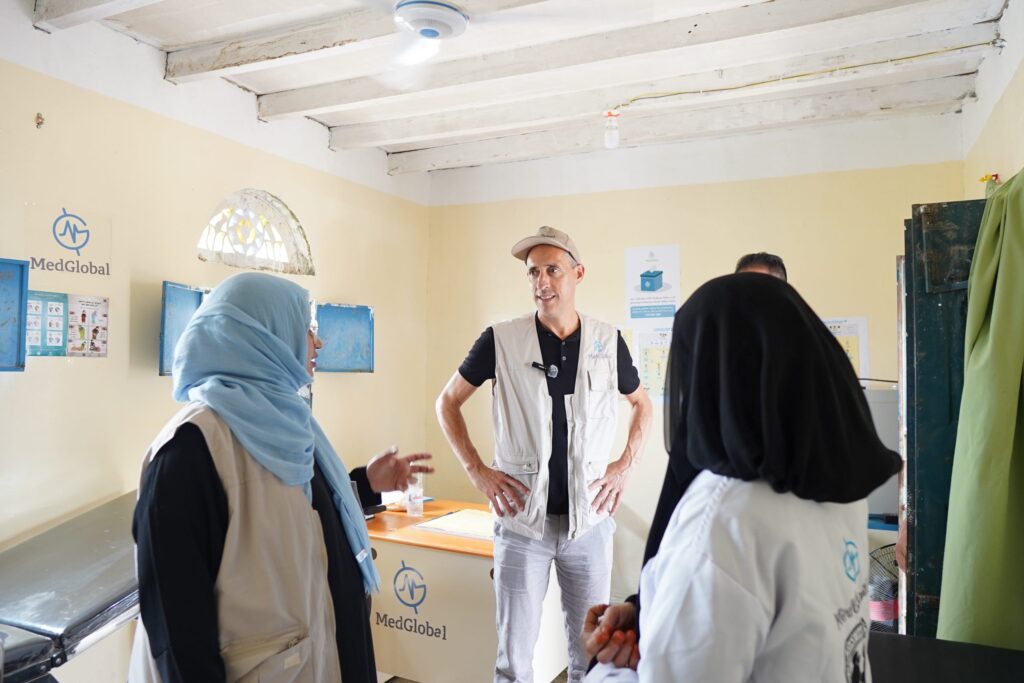Updates & Press
Blog Uncategorized | July 9, 2025
A Glimpse of MedGlobal’s Work in Yemen
Author | MedGlobalComms

I would like to share a glimpse of my last two days in southwestern Yemen. I have been a humanitarian for more than 25 years and I can truly say that what MedGlobal is doing here is special.
Earlier today, I stepped out of our vehicle about 2 hours inland from Mocha into a blast of 39C (102F) dusty wind. The landscape here is rocky, dry and inhospitable. Mocha may be famous for being the place where coffee originated, but today, inside Yemen at least, it’s more known for malnutrition, cholera, poverty and displacement.
Aside from a sign announcing our MedGlobal-supported Female-Friendly Clinic, the building looks like other surrounding houses – a box made of rocks and concrete with small windows and a flat roof. But inside is a gem of localization and sustainability.
We use those words often in MedGlobal, and here in this clinic they take on real meaning.
Meeting Muna, Midwife
Muna is a midwife who lost her husband in the war with the Houthis. She now lives here with her father. A room in their house, about 3 meters x 7 meters (10 feet x 20f feet), is dedicated to the maternity clinic. It’s clean, bright and well ventilated.
The first thing Muna says is that she only uses the autoclave to sterilize her equipment during the day. If she uses it after sunset she’ll quickly use up all the solar-powered battery life. Solar makes sense here and it powers the whole clinic, including Muna’s Point-of-Care Ultrasound (POCUS) machine.
Her eyes are all I can see of her niqab-covered face, and they smile delightfully when she speaks about her POCUS. She used to have to walk to a private health clinic and pay a large sum of money if a patient needed an ultrasound. Now she provides it routinely, right here, to see if her pregnant clients’ babies have any complications. And those women love seeing the image of their unborn babies!
Muna is from this village. She was a midwife before MedGlobal arrived, but without the right space, equipment and supplies, and with a rusty education, she struggled to provide the quality of care she strives for.
Creating Sustainable, Affordable Services
MedGlobal’s deal with Muna and nine other women in this area is simple. We upgrade her skills, set her up and supply her. She provides quality midwifery services to her community and reports back to us.
We don’t pay the midwives; they charge for their services. This is key to the sustainable part. Muna’s prices vary from about $7-15 USD, but she doesn’t turn any woman away. She knows what people can afford and she has a deep vested interest in caring for her community even if that means offering her care for free.
And the proof is in the results! Twenty-one healthy new babies delivered, and dozens more ante- and post-natal visits since the clinic kicked off just seven weeks ago. It works.
It is also recognized by the Ministry of Health. The District Health Officer dropped in on one of our clinic visits and was quick to say how much he valued MedGlobal’s approach, bringing him, the midwives and other community representatives into the process right from the drawing board of this initiative.
This is Just the Beginning
I have seen a lot of profoundly meaningful medical humanitarian work over the past 25 years. I have rarely seen a model this truly localized and with such clear roots of sustainability planted from the beginning.
All of the midwives I met over the past two days feel empowered and inspired. I believe they will continue to play vital roles not only for maternal/child healthcare but as pillars of their communities for years to come.
I am proud of what our team is doing here and share in their vision to go from 10 to 20 to 100 such clinics and help change the face of community-led healthcare in Yemen.


